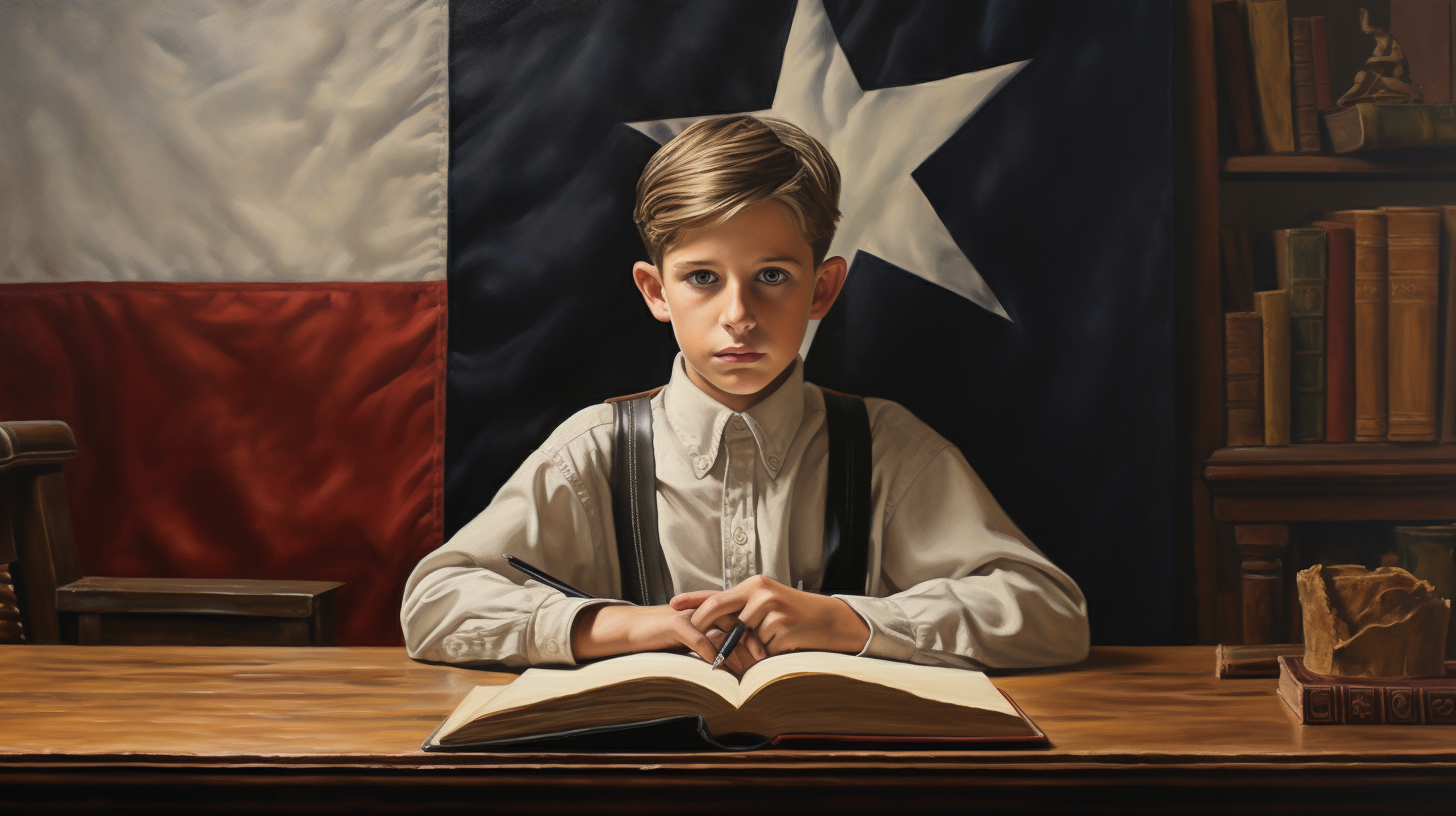"A book is like a garden carried in the pocket." - Chinese Proverb
What treasures lie hidden in the pages of a book? Worlds that sweep us away, characters that feel like friends, ideas that challenge and uplift. Books open doors in our minds, leading us through undiscovered passageways. Yet some seek to restrict access to these magical portals, guarding the gates with laws and limitations.
In Texas, a fierce battle rages over the freedom to explore the winding paths books provide. HB 900, dubbed the "book rating law," erects barriers to accessing certain titles, requiring vendors to evaluate and label books based on sexual content. Supporters believe this protects children, while opponents argue it infringes on rights. As debates heat up, let us peer past the political friction and examine the law's essence. What values underpin its mechanisms? Do the ends justify the means?
First, some background. HB 900 began its legislative journey in early 2022, sponsored by Representative Jared Patterson. It swiftly navigated the House and Senate before landing on Governor Abbott's desk in June, scheduled to take effect September 1st. However, a coalition of bookstores and publishers immediately filed suit, alleging First Amendment violations. On August 31st, Federal Judge Alan Albright concurred, blocking the law's enforcement via preliminary injunction.
The state swiftly appealed to the 5th Circuit Court, which temporarily stayed Albright's order through an administrative procedure. Thus, HB 900 currently remains in effect pending the higher court's decision. Both sides have filed extensive briefs, with oral arguments slated for November 29th.
Now, let us delve into the law's key mechanisms. HB 900 requires book vendors to rate materials as "sexually explicit," "sexually relevant," or unrated based on sexual content. Explicit books are banned from schools, while relevant ones necessitate parental permission. Moreover, the state can override any rating, forcing vendors to adopt the state's label. Noncompliance results in exclusion from school sales.
Proponents assert this shields children from inappropriate content. However, the law's vague wording and expansive scope raise concerns. Does a single sexual reference warrant the "relevant" tag? How are community standards defined? Can the state exploit the system for censorship? And does the burden on vendors violate their rights?
In his injunction order, Judge Albright excoriated the law's "web of unconstitutionally vague requirements." He deemed the rating duties needlessly "onerous," creating an "existential crisis" for booksellers. Albright further lambasted the law's "textbook example" of compelled speech by mandating vendors adopt state-prescribed labels.
In their 5th Circuit briefs, the plaintiffs also emphasize compelled speech issues alongside economic harms from lost school sales. Moreover, they highlight the subjectivity and futility of rating the enormous volume of books sold. Essentially, the law wrests local control from parents, teachers, and librarians, imposing a sweeping state-run administrative regime.
Meanwhile, Texas asserts the standard defenses - lack of injury until 2024, state sovereign immunity, and broad authority to regulate school materials. However, these procedural arguments sidestep larger concerns about unintended consequences.
Does shielding minors from sexual content justify collateral damage to constitutional rights? Can a ratings system ever avoid ideological biases? What principles guide determining "community standards"? Is it ethical to impose sweeping burdens on booksellers? Does limiting student access to literature - an empowering tool of growth - actually protect or inhibit development?
As C.S. Lewis wrote, "A children's story that can only be enjoyed by children is not a good children's story in the slightest." Books that resonate across ages often explore complex moral themes. While reasonable limitations serve an important purpose, broad strokes paint outside the lines, muddying the canvas.
Ours is a diverse, dynamic society. No single entity can define what material serves the greater good. Local engagement honors pluralism. Top-down control breeds conformity and exclusion. Communities thrive through cooperation, not coercion.
While HB 900 aims to protect, its methods may backfire. As Abraham Lincoln said, "Books serve to show a man that those original thoughts of his aren't very new after all." Ideas evolve through open exchange. Restricting content risks regression.
Yet change flows from understanding, not condemnation. We must uplift our shared hopes despite divergent beliefs. As Martin Luther King wrote: "Darkness cannot drive out darkness; only light can do that." The light of free thought and speech shines brighter when focused through compassion.
The garden of literature offers bountiful fruit, but all plants require nurturing to bear the sweetest harvest. Through patient cultivation, we can discourage harmful weeds while helping beautiful blooms flourish. But forceful pruning often stunts growth. The healthiest gardens grow organically.
While HB 900's outcome remains uncertain, its lasting impact may be increased awareness. Every challenge presents an opportunity to clarify values. What rights do we cherish? What boundaries best balance freedoms? How do we enrich our world through sharing stories?
As we each ponder these questions, our collective answers will shape society. Books themselves merely supply the seeds. Our ideals determine what flowers can bloom. Just as pages turn, bringing new chapters, so too can this debate inspire progress.
Though the journey is long, navigating by constitutional principles steers us true. On every path, we must walk with care, seeking to uplift humanity. Our finest futures blossom when rights are nourished, not stifled. Heeding this wisdom, we can write a story that empowers all who read it.
As Ray Bradbury wrote, "There are worse crimes than burning books. One of them is not reading them." Let us keep our minds open but disciplined, critically examining issues from all sides. Truth emerges through rigor, sincerity and patience. Justice requires wisdom in action.
With shared dedication to enlightenment, we can thoughtfully shape society for generations unwritten. That inspiring endeavor begins with a single step - turning the page, entering the garden, and exploring new worlds between bindings. Ideas whisper wisdom, awaiting curious minds to listen. A thousand journeys begin here. Let us travel them together.
Beyond Legal Limits, Literature Liberates
While the mechanics of HB 900 focus on labeling and access restrictions, the deeper debate concerns literature's role in society. Books hold up mirrors, windows, and doors - reflecting humanity, opening vistas, and welcoming discovery. Throughout history, stories catalyzed social change by challenging norms. Restricting content risks hindering that progress.
Great literature frequently explores complex moral themes involving sexuality. From Shakespeare to D.H. Lawrence, authors have long used intimate relationships to probe philosophical questions of virtue, desire, consent, and human nature. While reasonable limitations serve an important purpose, broad censorship paints outside the lines, distorting the canvas.
Nuance matters. Not all portrayals are equal. Context, style and artistic merit make the difference between gratuitous and meaningful content. No bureaucratic label can capture these subtleties. Sweeping standards often miss the mark, disregarding artistic value.
Moreover, youth deserve access to age-appropriate materials that resonate across generations. Children face serious issues like abuse, assault, pregnancy, orientation, and identity. Stories dealing sensitively with these topics provide windows into experiences beyond one's own, nurturing empathy and understanding.
Literature also helps youth navigate physical changes and budding sexuality. Censoring content leaves curiosity unguided, hindering healthy development. Age-tailored stories demystify topics, empowering agency over one's body and relationships.
While schools rightfully implement standards, public libraries serve a broader mandate - facilitating voluntary exploration. Within reasonable limits, access furthers knowledge, especially for marginalized groups. Limiting selection contradicts core library values like intellectual freedom, privacy, and equal access.
Local Control Cultivates Community
Top-down control over school curricula and library collections is concerning. Parents, teachers and librarians know their students and patrons best. Local engagement honors community standards and pluralistic values. Imposing statewide edicts breeds mistrust and ideological agendas.
Education thrives through cooperation, not coercion. Parents rightfully exercise primacy over their own children's reading. But no parent can dictate what others access. Schools and educators earn trust by transparently collaborating with families to shape appropriate curricula.
Likewise, librarians are trained in collection development, catering to local needs and balancing viewpoints. Their professional ethics prohibit promoting personal agendas. State mandates undercut their expertise and community relationships by interposing political motivations.
Local control also allows adapting to each child's maturity level. Developmental differences mean no universal standard fits all families. Parents can opt out of school assignments if desired, while libraries allow individual choice. But statewide bans impose conformity, overriding personal discretion.
Moreover, enforcing sweeping regulations strains schools and libraries. Rating all reading material is a monumental, subjective task bordering on impossible. The associated costs and burdens detract from core educational missions. Time and funds are better directed at enriching learning opportunities.
Unintended Consequences Loom
However well-intentioned, HB 900's broad scope holds unintended dangers. Vague, expansive rating systems are prone to ideological hijacking and overreach. Sweeping power to censor school materials based on subjective judgments of sexual content is ripe for abuse.
The law's broad definitions could even capture many classics and award-winning YA books dealing with sexual themes, abuse, or orientation. Where should the state draw the line between "explicit" and "relevant"? Can any official make such subjective calls for millions of students and families statewide?
These concerns are not hypothetical. Recent educational gag orders regarding race and orientation controversies illustrate how bureaucratic oversight becomes politicized. Imprecise rules spawn partisan application, not impartial enforcement.
Once censored, books rarely return as political winds shift. But encouraging free thought requires exposing minds to diverse ideas. However uncomfortable, open inquiry and civil debate represent democracy's lifeblood. Suppressing dissent or scrutiny undermines human progress.
While protecting children's innocence seems noble, the costs to civil liberties and social advancement from censorship often outweigh purported benefits. There are better ways to balance interests than statewide content restrictions imposed under threat of punishment.
The Road Forward - Clarifying Values, Upholding Freedoms
Looking ahead, HB 900 will likely undergo legal challenges for years. But the lasting impact may be increased public awareness and engagement on censorship issues.
Every controversy presents opportunity for growth. As we reflect deeply on values, new understanding blossoms. What principles matter most in balancing rights - freedom of thought, speech, and access against protecting impressionable minds? How do we define the common good when views diverge?
A pluralistic society requires nuance in aligning competing interests. Through good faith discourse, we can gain wisdom and clarity. Shared truths emerge from synthesizing diverse perspectives - combining progress and tradition into coherent principles.
With compassion and sincerity, political opponents become fellow travelers on society's winding road. By uplifting our common humanity despite disagreements, we pave a smoother path forward.
On every complex issue, the soundest solutions draw from life's many facets - law, ethics, science, faith, reason, emotion. Integrating broad insights dispels ignorance. Blindness comes not from conflicting views, but refusal to see beyond them.
As Martin Luther King wrote: "Darkness cannot drive out darkness; only light can do that." That light shines brighter when focused through understanding. Patience and courage guide us through the shadows toward justice.
Fundamentally, we share the light of liberty granted by laws. Just authority derives from informed consent, not coercion. To secure our rights requires eternal vigilance. Freedom's blossoming depends on each mind's nourishment.
Yet rights bring responsibility - to self and others. No freedom is absolute; all have limits. But absent clear harm, restrictions require compelling cause, not speculative fears. Our finest futures flower when rights are responsibly nurtured, not reflexively stifled.
On all sides, most citizens sincerely want what is best for the next generation. With malice toward none, we must uplift our common hopes. The path ahead curves in hope's arc when we walk with care for all.
Conclusion - Exploring Together
Like the pages of a book, the road society travels contains many turns. To navigate forward through complex debates, shared values must guide us. When principles provide the map, progress flows from passion tempered by reason.
The garden of literature cultivates human growth through exploring life's subtle contours. Yet some fences contain its reach, purporting to protect the innocent. While children merit sheltering, broad barriers often undermine the very values they aim to preserve.
As Texas contends with clashing perspectives on youth and literature, may our better angels prevail. Through compassion and sincerity, we can elevate understanding across divides. No single view holds the whole truth. Wisdom lies in synthesizing different insights.
By upholding freedoms responsibly, we can write a story that empowers all people. The ending remains unpenned, awaiting our hands. On every page, progress blooms when rights are nourished, not stunted. Heeding this wisdom, our finest futures can blossom.
So let us turn the page together, entering literature's garden with care. May we thoughtfully tend the seeds of knowledge, sharing bountiful harvests for generations to come. Though the path meanders, justice and human dignity can blossom when we walk it in liberty's light.



